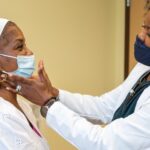Everyone can play a role in supporting health literacy and better health outcomes
ERIE COUNTY, NY – The Erie County Department of Health (ECDOH) and Literacy Buffalo Niagara (LBN) are partnering on a week-long campaign to raise awareness about health literacy. Starting October 17 – during October, Health Literacy Month – ECDOH and LBN will share advice for organizations and resources for people with lower literacy skills. The campaign will make connections between health literacy skills and better health outcomes. Look to these organizations’ social media accounts and a new, dedicated web page for health literacy on the ECDOH website.
“A person’s ability to read and understand English affects their ability to understand medical diagnoses, prescription directions, and important health alerts,” said Erie County Commissioner of Health Dr. Gale Burstein. “So much of our healthcare system is built on written messages. Those messages must be presented clearly, whenever possible.”
Accurate, credible and timely health information is only as valuable as the community’s ability to understand and act on those messages. “Literacy Buffalo Niagara works with individuals to improve reading, writing and comprehension skills. We know that around 150,000 adults in Erie County would struggle to read this press release,” said LBN Executive Director Tara Schaefer. “We hope that organizations join us as we consider low literacy populations when developing print materials and other communications.”
Low literacy skills contribute to health care costs. According to ProLiteracy.org, between $106-238 billion in health care costs each year are linked to low adult literacy skills. The impact on health outcomes also exacts a high price: limited health literacy leads to higher hospitalization rates and emergency medical service use.
“Low literacy skills can be an invisible barrier when accessing the health care system, employment, housing, and other social determinants of health,” said ECDOH Office of Health Equity Director Kelly Wofford. “Reading well is a gateway to making informed health decisions. We have the opportunity and responsibility to ensure that public health and safety messages are accessible and easy to use.”
Basic ideas from plainlanguage.gov to make written communications easier to read and understand include:
- Write for your audience
- Organize information
- Choose words carefully
- Use concise language
- Keep it conversational
How to Help
- ECDOH and LBN have developed a web page with resources for writing with plain language and other best practices for low literacy audiences. [http://www.erie.gov/healthliteracy]
- LBN recruits volunteer tutors to work one-on-one with adults who need support and literacy skills development. Call (716) 876-8991 to become a student or tutor.
- Support local libraries and the Buffalo & Erie County Public Library. All residents – including low literacy residents – rely on public libraries for reading material at all reading levels and tutoring spaces.
Health Literacy Defined
According to the U.S. Department of Health and Human Services’ Healthy People 2030 campaign, health literacy can be defined as:
- Personal health literacy: The degree to which individuals have the ability to find, understand, and use information and services to inform health-related decisions and actions for themselves and others.
- Organizational health literacy: The degree to which organizations equitably enable individuals to find, understand, and use information and services to inform health-related decisions and actions for themselves and others.
Literacy Buffalo Niagara (LBN) is the sole provider of free one-on-one adult literacy tutoring in Erie and Niagara counties. LBN works with adult students who are learning English as a second language and native English speakers who lack necessary reading skills. Their mission is to increase literacy rates by providing free tutoring in Erie and Niagara counties through the engagement and training of diverse volunteer tutors. Their vision is that all people in Erie and Niagara counties are literate.
- Erie County Department of Health, Health Literacy: www.erie.gov/healthliteracy
- Literacy Buffalo Niagara: www.literacybuffalo.org
- Buffalo Public Schools Adult Education Department: www.upskill.org
- Gerard Place: www.gerardplace.org
- Centers for Disease Control and Prevention, Plain Language:https://www.cdc.gov/healthliteracy/developmaterials/plainlanguage.html
- Plainlanguage.gov












